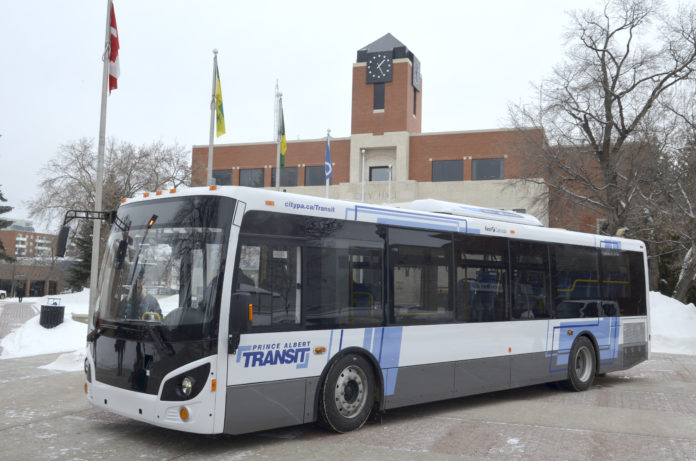A conversation that began with council looking at options to procure more buses for public transit ended with councillors asking whether the City should oversee its own busing service instead of third party operators.
Engineering Services Manager for the City of Prince Albert Mohammed Kraishan started the conversation with a presentation on the procurement review at Monday’s Executive Committee meeting. Krishna said the one bus owned by the City will need to be replaced by next year, but several members of Council spoke out that getting new buses won’t solve the transit issues at hand.
Ward 8 Coun. Ted Zurakowski said the number one problem with the transit service is the communication between the third-party bus operator and the City of Prince Albert.
“Regardless if we purchase additional buses, it’s the daily communication that I think will make a world of difference to a lot of families and a lot people trying to get to work in the morning,” Zurakowski said. “If we buy three new buses tomorrow and no bus driver shows up, it doesn’t matter. There’s still no bus operating.”
The transit service in Prince Albert is currently run by a third-party operator. Kraishan said the City can’t provide the public with updates unless the operator lets the department know beforehand.
He explained that providing timely updates is not one of the responsibilities laid out in the contract between the transit operator and the City, but it is something the department is going to work on to see if it is an option.
“One of the things about this job that continually surprises me is the lack of authority, influence, power sometimes the City has,” Zurakowski said. “This may be one of those cases where we are dependent on the efforts of a third-party.”
Communications Manager Kylie Bear said one of the issues with communication also lies within the City. She said the webpage where the service notifications are shown can be confusing for the public.
“(It’s) just maybe the way that those updates are going out could be a little bit better,” said Bear. “We’re going to start a new process this week to see if we can just get up something that works for us, works for the public.”
Coun. Blake Edwards suggested the City look into the use of a transit app so ridership can have immediate updates, instead of having to search for the notifications through the City website.
No matter what option is chosen; it would be best for the City to run the service itself, said Coun. Tony Head.
“We would have more control on the communication, on the routes, on the timeliness, the reliability of these services if we had more say as a City, as a municipality,” said Head. “Having this controlled by Public Works could be a benefit to us moving forward.”
Kraishan said that City Staff has been looking into both new and used options for transit buses after frame deficiencies were discovered in the seven city-owned units in April of 2021. The buses were then subsequently removed from service.
The replacement unit for the city-owned bus will cost $700,000 for a new low-floor, diesel transit bus and will take approximately 15 to 24 months to be fabricated and delivered. The unit has an estimated lifespan of 12 to 15 years, making it ideal for “quality of service, accessibility and comfort,” according to the review.
At the end of 2022, the Transit Fleet Reserve will have a total sum of $850,000 and after the replacement of the city-owned unit, the reserve will be left with a total of $150,000.
Since the issues first arose, the City has been leasing buses for public transit from several different suppliers, but Administration is now branching out and researching purchase options instead.
The City has been leasing six buses from First Bus ULC since March, with two more coming within the next 10 days, according to Kraishan. Currently, the City is paying $1,000 per month per bus, equal to around $12,000 per year for each of the six buses that are being leased.
In the report, administrators wrote that the leased buses are a reliable short to medium term plan for the City, but moving forward newer and more accessible transit buses would be an asset to provide quality service.
A review by the Department of Public Works in Sept. found options to procure used units for anywhere between $100,000 to $300,000 depending on what is available on the market at that time. These buses come with a shelf-life of between five to seven years and will need to be repaired once they arrive to make sure they fit the needs of the City.
“I’m a little disappointed that we’re only have the one [bus] coming to City Council because I think we need to do more in this regard. I would like to see some other options,” said Head. “I think we need to take a drastic look at our bus services and assure that we have reliability moving forward for all our residents.”


